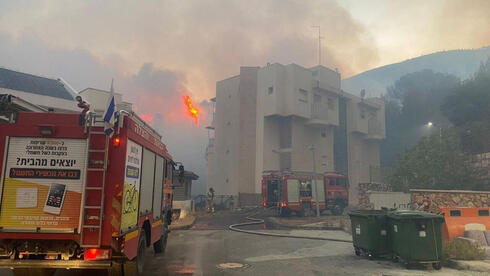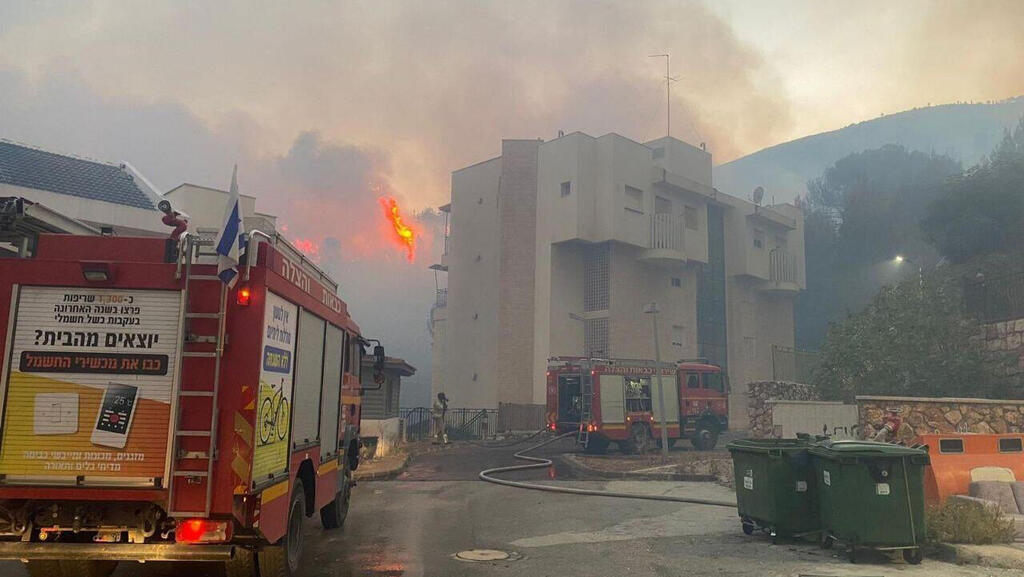
Fear of all-out war throws Israel's economy into whirlwind of uncertainty
The assassinations in Beirut and Tehran, along with the expected retaliation from several fronts, could lead to a significant security deterioration and substantial damage to Israel's economic activity. After 10 months of continuous war and government mismanagement, the price may be too heavy to bear.
The assassinations of senior Hamas and Hezbollah leaders, Ismail Haniyeh and Fuad Shukr, have put Israel on high alert. The Israeli security establishment has effectively placed the ball in the court of the resistance axis led by Iran. The Iranian connection is critical, as Iran's supreme leader, Ali Khamenei, has threatened severe punishment for Israel's actions, raising the possibility of a regional flare-up that could escalate into a multi-front all-out war. Defense Minister Yoav Galant stated, "We do not want war, but we are preparing for all possibilities." Indeed, Israel is bracing for war scenarios of varying intensities, with potential impacts on both the economic and civil spheres.
The current state budget and economic forecasts on which Israel is operating are based on the assumption that the war in the south will deescalate during 2024, while the situation in the north remains stable or improves, avoiding an all-out war. However, these assumptions will be invalid if a direct conflict with Hezbollah erupts, involving the massive firing of rockets and missiles into Israel's home front, potentially reaching Tel Aviv. Such a scenario would likely include a large-scale mobilization of reserves and possibly an Israeli ground maneuver in Lebanon. This outlook is even more concerning if Iran and its affiliates in Iraq, Yemen, Syria, and armed groups in Judea and Samaria also engage in prolonged fighting against Israel.
Disruption of supply systems and armament economy
Israel officially refrains from publishing economic forecasts for the possibility of a significant security deterioration. In the latest macroeconomic forecast from the Bank of Israel in July, it was noted regarding the spread of fighting that "an escalation to additional fronts (especially the north) or significant involvement of additional parties could lead to widespread shutdowns of workers and businesses, damage to infrastructure, and disruption of foreign trade channels (for example, through the disruption of shipping lanes), potentially causing significant harm to economic activity, increasing financing and security costs, and decreasing tax revenues."
In the explanatory notes to the updated 2024 budget approved by the Knesset last February, a "severe scenario" was outlined: "Given the high level of uncertainty associated with the fighting, in addition to the main scenario on which the macroeconomic forecast for 2024 is based, the Ministry of Finance also formulated a severe attribution scenario. This scenario assumes stricter conditions than the base scenario regarding the development of the fighting, including its intensity across various arenas, its duration, and the economy's recovery accordingly. It is based on the assumption of extensive reserve mobilization and significant disruptions to the education system. In this scenario, the growth forecast for 2024 stands at minus 1.5%." This contrasts with the base scenario of positive growth of 1.6%.
Since then, senior officials in the Ministry of Finance have clarified that the scenario presented in February is no longer relevant, and that there are now a variety of other scenarios, which they are not currently disclosing to the public. They have also indicated that "a short war is preferable to a prolonged one."
In contrast to government institutions, public research institutes had already warned in the first months of the war that the severe scenario must be considered. Notably, Professor Zvi Eckstein from the Aharon Institute for Economic Policy presented extreme scenarios for a war in the north. These scenarios, developed in collaboration with security experts such as Amos Yadlin and Giora Eiland, were presented as early as January 2024. The scenarios of public research institutes tend to be more pessimistic. For example, the Aharon Institute predicts negative growth of 2.5% in the event of a limited war in the north, while the Institute for National Security Studies (INSS) estimates that growth in 2024, in the event of a total war in the north, could range from minus 2% to minus 10% GDP.
These forecasts focus on macroeconomic variables such as growth, deficit, and the debt-to-GDP ratio, and do not include direct costs expected from an all-out war, which are anticipated to reach tens of billions of shekels. A senior official in the defense establishment, speaking with Calcalist last month, stated that the defense establishment has already internally estimated the direct costs of various northern campaign scenarios, including the mobilization of reserves and associated costs. He noted that in such a case, all the assumptions currently underpinning the economic system would be irrelevant, due to significant disruptions in daily life throughout the country, including in central areas.
"An extensive war is an entirely different scenario, though somewhat similar to the start of the current conflict, only much more intense. Israel is now entering at a less favorable starting point. The key question is the duration—are we talking about weeks or months?" The defense establishment is also concerned about the management of a war economy, which this time may involve a more extensive use of interceptors of all types, compounded by the possibility of supply chain disruptions and difficulties in importing goods.
The deficit at the end of the year is expected to reach up to 15%
At the start of the week, the Institute for National Security Studies published a document titled "Consequences of Continued War on Israel's Economy: Three Scenarios." The document, authored by researchers Tomer Fadlon, Esteban Klor, and Ofer Shelah, examines the potential impacts on Israel's economy if the current situation persists, if there is a comprehensive arrangement and deal for the release of abductees, or if there is an escalation in the northern arena. Regarding a northern scenario, the researchers write that "it is difficult to predict where such an escalation, initiated by Israel, could lead. In a severe but plausible scenario, it could develop into an all-out war on the northern front, with open multi-faceted involvement from Iran and other axis affiliates. However, for the purpose of this analysis, we are assuming a limited Israeli move in the north, leading to a high-intensity campaign lasting about a month against Hezbollah only."
According to the institute's researchers, in the event of a month-long war in northern Israel, the country could face negative growth of between 2% and 10% in 2024, with the deficit reaching up to 15% and the debt-to-GDP ratio climbing to 80% to 85%. In 2025, growth is expected to be between 5% and 7% (it is important to note that this growth follows a significant contraction of the economy), the deficit is projected to be 10%, and the debt-to-GDP ratio is expected to remain above 85%.
The document highlights that one of the significant, unpredictable factors that may directly affect the economy is the degree to which Israel succeeds in intercepting threats and minimizing damage to the home front, particularly to strategic facilities and national infrastructure. In this context, they compare Israel to Ukraine, which, according to the document, is an example of a country suffering from a war on its territory that consistently damages the home front and completely disrupts economic activity. The document notes that in the first year of the war, Ukraine experienced an economic contraction of about 30% of GDP, though it qualifies this by stating that the war began in the first quarter of the year, lasted the entire year, and included a Russian military maneuver within its territory.
Regarding the long-term economic consequences of a northern war, the document states that any increase in the risk premium will lead to a significant rise in interest payments on Israel's public debt. A permanent increase of one percentage point in interest on the public debt would entail an additional payment of over NIS 10 billion per year.
A significant paralysis of economic life
In a conversation with Calcalist, Ofer Shelah, who currently serves as a senior researcher at the institute, says that the economic scenario presented in the document is still limited and differs from the reality of an extensive multi-arena war. "An all-out war against Hezbollah alone would cover the entire State of Israel and particularly its northern part in a very dense manner, and Israel has no answer for that. We do not have enough Iron Dome systems to protect Haifa from barrages of hundreds of rockets a day, which would cause great destruction. This would mean a paralysis of economic life, both in terms of reserve recruitment and in the context of fear of leaving home. There is also the question of what will happen to reservists whose homes are bombed while they are in the reserves, and this is without even discussing the unprecedented attrition of reservists in combat units. This is something that the Israeli economy does not know, and it is a very heavy price to pay. It is not certain that the concept of negative GDP growth adequately describes this reality. However, this does not mean that the event will overwhelm us or that we cannot withstand it."
Regarding the management of the war economy and the IDF's manpower, Shelah says that "the decisions of the political and military echelons have not matched the terms of engagement discussed at the beginning of the war, nor the goals of the war. You cannot fight a war with such long-term timelines while relying on both an army and an operational concept designed for short-term conflict. This campaign has not been managed either in terms of resource utilization, personnel, or international legitimacy. The war has not been conducted as though the resources at hand were perishable."
Shelah believes that Israel, in recent decades, has become accustomed to wars like the Second Lebanon War or Operation Protective Edge, which did not significantly impact the Israeli economy. "These were costs that did not significantly affect the Israeli economy. Here, we are in much less familiar territory. The main issue is still Hezbollah because we are dealing with very large amounts of weapons, and a multi-front scenario would multiply this challenge."
Commenting on the events of the past two days, Shelah said, "The assassination of Fuad Shukr was a correct response to the massacre in Majdal Shams. However, Nasrallah also faces dilemmas, and for him to drag Lebanon into war over the killing of one of his commanders is problematic." He adds, "The combination of this with the assassination of Haniyeh in Tehran creates a highly volatile situation that may be beyond Israel's control. Assassinations as a policy have almost never proven effective."
Esteban Klor, one of the authors of the document and a professor of economics at the Hebrew University and a senior researcher at the Institute for National Security Studies, whose research often deals with terrorism and security, offers another perspective. "Research on the elimination of leaders of terrorist organizations generally shows that it is an effective practice in defeating such groups. However, the research also emphasizes that the effectiveness is mainly seen in newer terrorist organizations. Moreover, it is doubtful whether these findings can be directly applied to Hezbollah and Hamas, as these are not classic terrorist organizations but rather semi-state entities."














